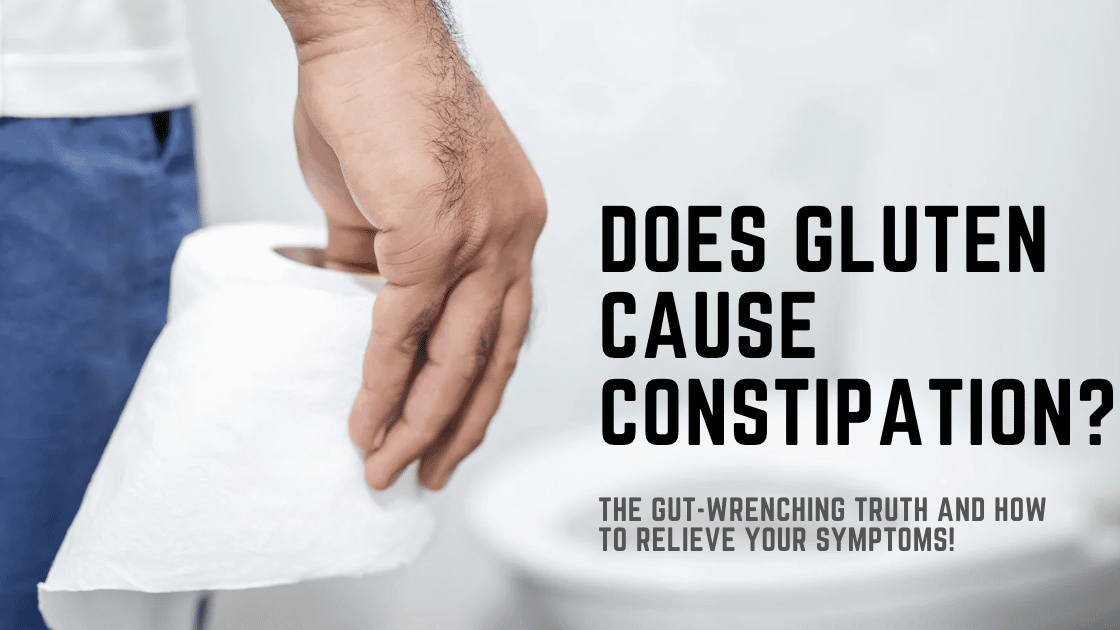Does Gluten Cause Constipation? – The Gut-Wrenching Truth

If you’ve been told that gluten can cause constipation, you might have thought it was an old wives’ tale.
After all, why would the same ingredient that makes bread fluffy and delicious also be responsible for making your daily bathroom breaks a challenge?
Well, as a celiac, I’m here to tell you that gluten definitely can play a significant role in causing constipation – but it’s not the only factor at play here!
If you suffer from digestive issues like bloating, cramping, and constipation, then read on to find out how gluten could be making you feel worse and how you can address the issue.
Understanding the Connection between Gluten and Constipation
Being part of the exclusive celiac and IBS club can be downright painful, especially regarding gluten-induced constipation.
Don’t take your food freedom for granted – if you want to avoid anything from bloating to off-the-chain gas to irregularity, you must ensure that your diet is 100% gluten-free.
Whether it’s wheat, rye, barley, or malt, all sources of gluten must go!
If you’re unsure about something in particular, always consult a nutritionist or doctor – they can help you pinpoint the offenders and create an eating plan tailored to your needs.
And don’t forget: you can have a happy stomach and peace of mind forever by understanding the link between gluten and constipation.
The Gut-Wrenching Truth: Common Causes of Gluten-Induced Constipation
As a celiac, I’ve had to become incredibly savvy about the foods containing gluten that I need to avoid.
From malt-flavored candies to pre-packaged sauces and soups to surprisingly unexpected sources like oats and grains, there can be hidden dangers lurking in our kitchen cupboards.
Unfortunately, even when you’re careful, it’s challenging to completely eradicate gluten from your diet because of cross-contamination risk and accidental ingestion – which means occasional exposure is nearly inevitable.
But why does gluten cause such violent constipation for us celiacs? Simply put, it all comes down to our immune system.
When we consume gluten, our body perceives this protein as a threat and triggers an immune reaction to protect us from harm.
This immune response increases inflammation in our guts, disrupting the delicate balance of bacteria and other good linings in our stomachs, leading to very uncomfortable and painful constipation.
So next time you feel backed up, it might indicate that you accidentally stumbled into a gluten-filled minefield.
Helpful Solutions: How to Relieve Gluten-Induced Constipation
Do you suffer from the dreaded gluten-induced constipation?
If so, rest assured, knowing that it is a common symptom of celiac disease and can be managed with the proper diet and lifestyle changes.
Here are some tips for relieving constipation and improving gut health:
- Add fiber-rich foods to your diet, like beans, legumes, fruits, and vegetables.
- Incorporate low-FODMAP foods like blueberries, potatoes, onions, salmon, tuna, and chicken into your meals.
- Increase your physical activity levels by taking walks throughout the day or going to a gym class.
- To manage stress levels, practice relaxation techniques, including deep breathing and yoga.
- Avoid overindulging in processed foods, alcohol, and caffeine.
Following these simple steps can significantly reduce your constipation symptoms and improve your overall gut health.
Conclusion: Does Gluten Cause Constipation?
Taking action to relieve your celiac symptoms is a must: trust the good doctor and your gut!
If you’re still feeling sluggish or blocked, don’t hesitate to speak with someone in the know.
With the right treatments and lifestyle changes, constipation doesn’t have to be an ongoing problem – there’s hope and help out there.
So don’t fret; seek knowledge and rest assured that living a gluten-free life needn’t be a chore!
FAQs
Why do I get constipated when I eat gluten?
Eating gluten can lead to constipation because it can slow your digestion, making it more difficult for your body to absorb necessary nutrients and pass stools. Try incorporating more fiber-rich foods into your diet to help ease constipation.
What helps with constipation from gluten?
Eating more fiber-rich fruits and veggies, drinking plenty of water, and exercising regularly can help improve constipation caused by gluten.
Can gluten cause hard stools?
Yes – gluten can be challenging for some people to digest, potentially leading to hard stools and other digestive issues. Ensure you keep an eye on your diet and look out for any signs of discomfort!
Does going gluten-free help with constipation?
Going gluten-free may help manage constipation symptoms, but seeking professional advice is highly recommended. Before making any dietary changes, speak with a registered dietician to ensure you do what’s best for your body.
Does gluten cause diarrhea?
Gluten can cause digestive issues like diarrhea in some people. Talk to your doctor about diagnosis and treatment if you experience digestive problems after eating foods containing gluten.
Disclaimer: This content is based on my personal experience as an individual diagnosed with celiac disease and IBS (Irritable Bowel Syndrome) who follows a strict gluten-free diet. This does not constitute medical advice. Please consult a medical professional, nutritionist, or qualified dietitian for personalized, professional advice.

